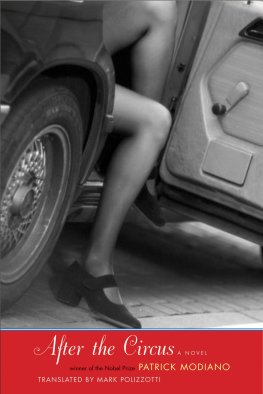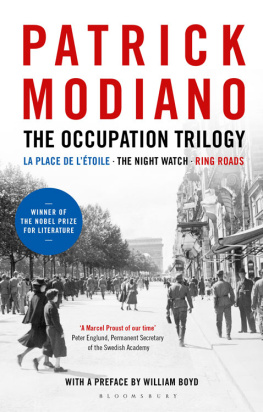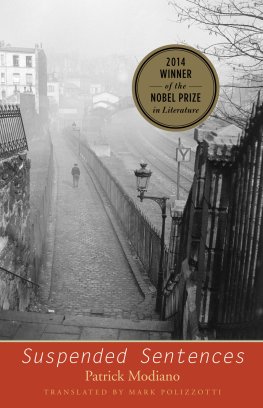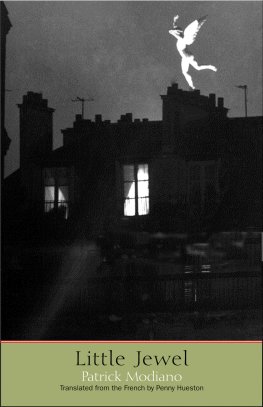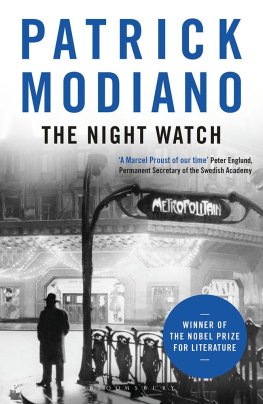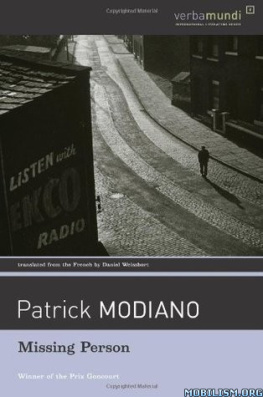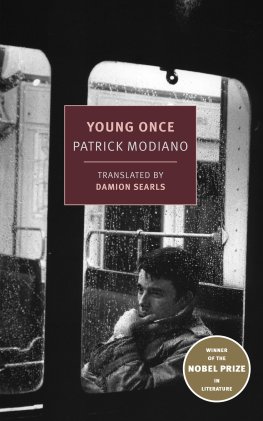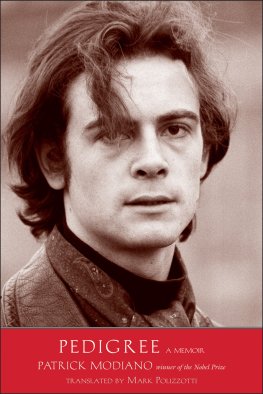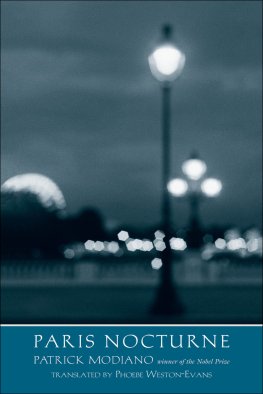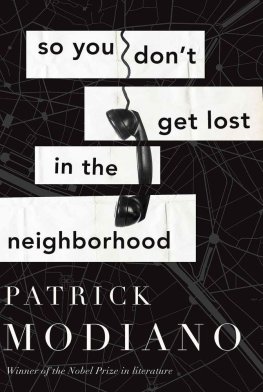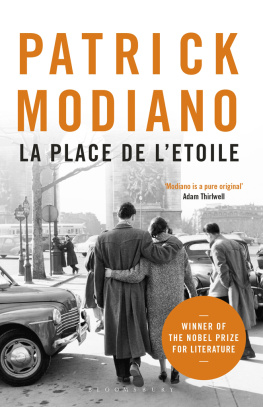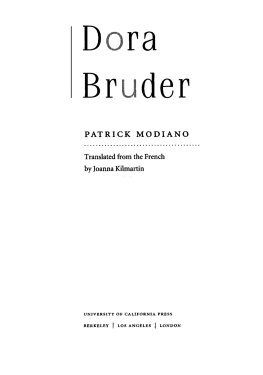Patrick Modiano
After the Circus
I was eighteen, and the man whose face I dont recall was typing up my legal status, address, and supposed student enrollment as fast as I could state them. He asked how I spent my free time.
I paused for a few seconds.
I go to movies and bookstores.
You dont just go to movies and bookstores.
He cited the name of a caf. No matter how often I repeated that Id never set foot in the place, I could tell he didnt believe me. Finally, he contented himself with typing the following:
I go to movies and bookstores. I have never been to the Caf de la Tournelle, at number 61 on the quay of that name.
Then more questions about my activities and my parents. Yes, I took literature courses at the university. There was no danger in telling him that lie: I really had enrolled in the program, but only to prolong my draft deferment. As for my parents, they were both abroad and I had no idea when theyd return, if ever.
Then he mentioned the names of a man and a woman and asked if I knew them. I answered no. He told me to think very carefully. If I didnt tell the truth, there could be serious consequences. The threat was delivered in a calm, indifferent voice. No, really, I didnt know those two individuals. He typed my answer, then handed me the sheet, at the bottom of which was written: Seen and agreed to. I didnt bother looking over my deposition and signed with a ballpoint pen that was lying on the desk.
Before leaving, I asked why Id had to submit to that interrogation.
Your name was in someones address book.
But he didnt say who that someone was.
Well be in touch if we need you again.
He saw me to the door of his office. In the hallway, on the leather bench, sat a girl of about twenty-two.
Youre next, he said to the girl.
She stood up. We exchanged glances. Through the door that hed left ajar, I saw her sit down in the same chair that Id occupied a moment earlier.
I found myself back on the quay. It was around five in the afternoon. I walked toward the Pont Saint-Michel, thinking that I might wait for the girl to come out after her interrogation. But I couldnt just loiter about police headquarters. I decided to bide my time in the caf on the corner of Boulevard du Palais, where it meets the quay. And what if she had gone in the opposite direction, toward the Pont-Neuf? The thought never occurred to me.
I was seated near the window, my eyes fixed on the Quai des Orfvres. Her interrogation lasted much longer than mine. Night had already fallen when I saw her walking toward the caf.
As she was passing by, I tapped on the window with the back of my hand. She looked at me in surprise, then came inside to join me.
She sat down at my table as if we knew each other and had made a date. She was the first to speak.
Did they ask you a lot of questions?
My name was in someones address book.
Do you know who?
They wouldnt tell me. But maybe you can shed some light.
She knitted her brow.
Shed light on what?
I figured your name must have been in that address book, too, and they were questioning you about the same thing.
No. With me, it was just to give evidence.
She seemed preoccupied. It felt like she was slowly forgetting I was there. I kept silent. Then she smiled. She asked how old I was. I said twenty-one, making myself three years older: legal age, at the time.
Do you have a job?
I deal in used books, I said randomly, in a tone I tried to make convincing.
She looked at my face, no doubt wondering if she could trust me.
Will you do me a favor? she asked.

At Place du Chtelet, she wanted to take the metro. It was rush hour. We stood squeezed together near the doors. At every station, the riders getting off pushed us onto the platform. Then we got back on with the new passengers. She leaned her head on my shoulder and said with a smile that no one could find us in this crowd.
At the Gare du Nord metro stop, we were carried along in the flood of travelers heading for the commuter trains. We crossed through the train station lobby, and in the checkroom she opened a locker and pulled out a black leather suitcase.
I carried the suitcase, which was rather heavy. It occurred to me that it contained more than just clothes. The metro again, same line but in the opposite direction. This time we found seats. We got off at Cit.
At the end of the Pont-Neuf, we waited for the light to turn red. I was feeling increasingly anxious. I wondered how Grabley would greet us when we arrived at the apartment. Shouldnt I tell her about Grabley, so that his presence there wouldnt catch her off guard?
We walked past the Htel des Monnaies. I heard the clock on the Institut de France chime nine P.M.
Are you sure no one will mind if I come to your place? she asked.
Nope. No one.
There were no lights in the apartment windows facing the quay. Had Grabley gone to his room, on the courtyard side? Normally he parked his car in the middle of the little square that forms a recess between the Htel des Monnaies and the Institut, but it wasnt there.
I opened the door on the fourth floor and we walked through the foyer. We entered the room that had served as my fathers office. Light fell from a naked bulb dangling from the ceiling. No furniture left, except for an old couch with dark red leaf patterns.
I set the suitcase down next to the couch. She went to the window.
You have a nice view
To the left was one end of the Pont des Arts and the Louvre. Directly in front, the tip of Ile de la Cit and the small Vert-Galant park.
We sat on the couch. She looked around her and seemed amazed by the sparseness of the room.
Are you moving out?
I told her that, unfortunately, we had to vacate the premises in a month. My father had gone to Switzerland to live out his days.
Why Switzerland?
It really was too long a story for that evening. I shrugged. Grabley would be back any minute. How would he react when he saw the girl and her suitcase? I was afraid he would call my father in Switzerland, and that the latter, in a last gasp of parental dignity, would try to play the noble paterfamilias, lecture me about my studies and endangered future. But he was wasting his time.
Im tired
I suggested she lie down on the couch. She hadnt removed her raincoat. I remembered that the heating no longer worked.
Are you hungry? I can go get something from the kitchen
She sat on the couch, legs folded under her, resting on her heels.
Dont go to any trouble. Maybe just something to drink
The light in the foyer had gone off. The bow window in the wide front hall leading to the kitchen lit the room with pale glimmers, as if there were a full moon out. Grabley had left the light on in the kitchen. In front of the old dumbwaiter stood an ironing board on which I recognized the trousers of his glen plaid suit. He ironed his own shirts and other clothes. On the folding table, where I sometimes took my meals with him, was an empty yogurt jar, a banana peel, and a packet of instant coffee. He must have eaten in. I found two yogurts, a slice of salmon, some fruit, and a bottle of whiskey three-quarters empty. When I returned, she was reading one of the magazines that Grabley had let pile up for several weeks on the office mantelpiece, risqu periodicals, as he called them, for which he had a great fondness.
I set the tray down in front of us, on the floor.
She had left the magazine open next to her and I could make out the black-and-white photo of a naked woman, seen from behind, hair tied in a ponytail, left leg extended, right leg bent, her knee resting on a mattress.

